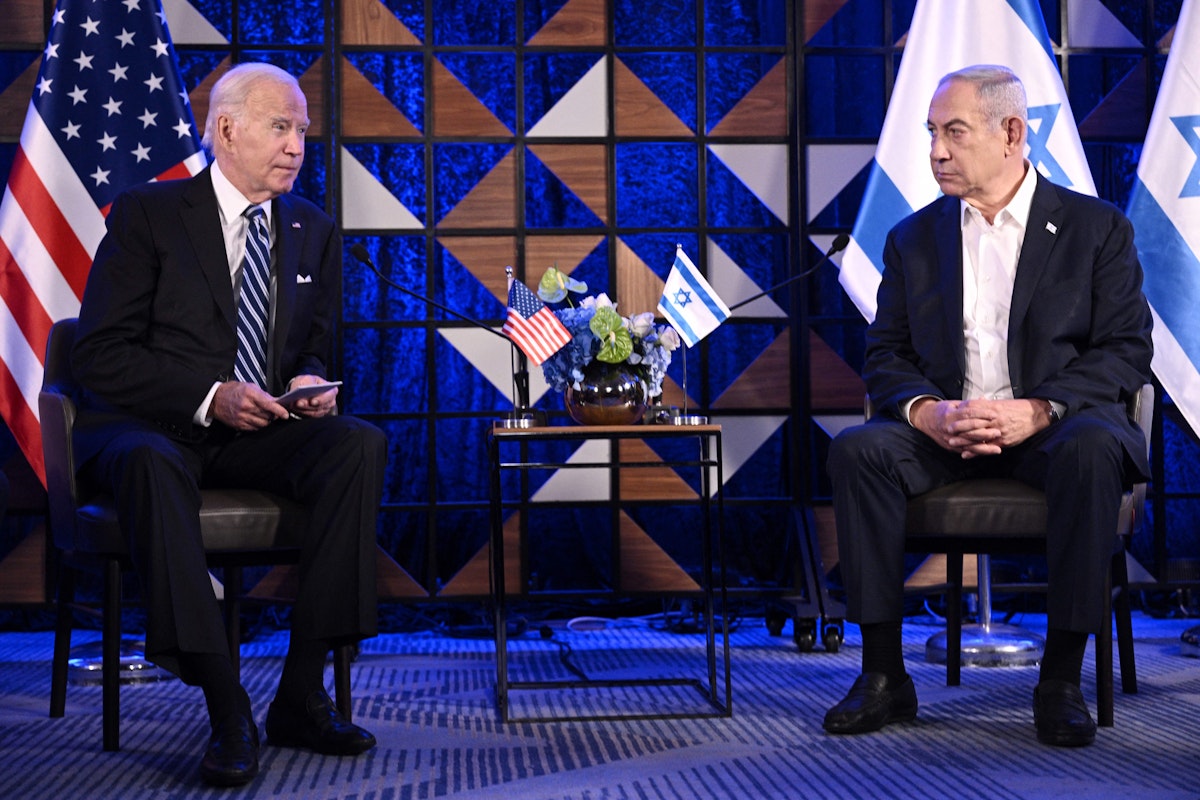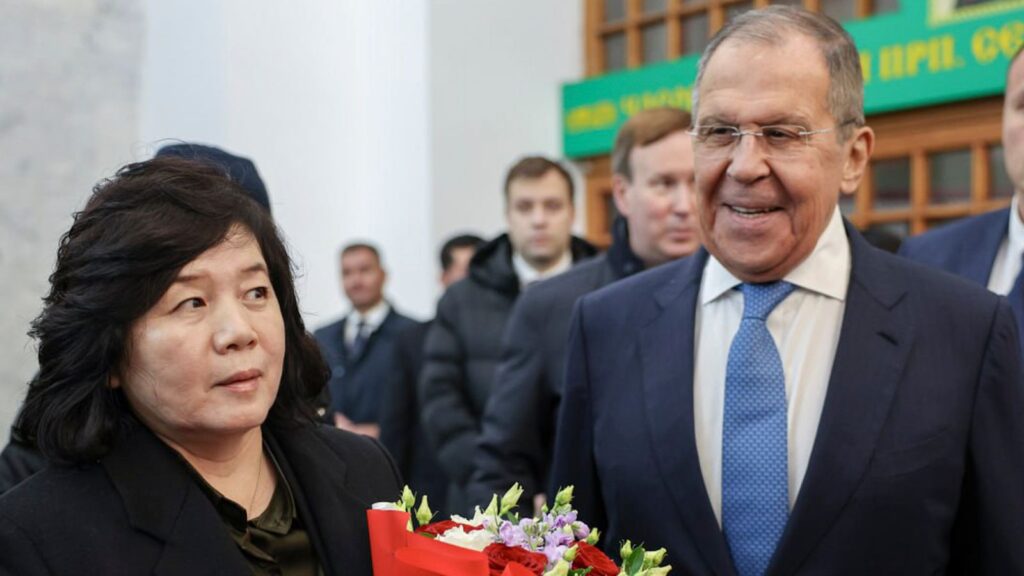How Biden Could Radically Alter the U.S.-Israel Relationship
On February 1, the Biden administration issued an executive order on violent extremism by settlers in the West Bank, which has been increasing over the past several months with the world watching the war in Gaza. The Biden administration accompanied this order with sanctions on four settlers who, it charged, had directly carried out violence or intimidation. This month, the Biden administration expanded the sanctions, adding three more settlers and two illegal outposts, which it said were bases used to “perpetuate violence against Palestinians.”This was met in some corners with condemnation: This executive order is about violence in the West Bank carried out by a limited number of settlers, while the Israeli army kills tens of thousands of people in Gaza, aided by the United States. Elsewhere, it was heralded as a potentially major development, a warning to Israeli Prime Minister Benjamin Netanyahu’s government, particularly given that U.S. officials told The Wall Street Journal that they were considering sanctioning two of his coalition’s extremist members, Finance Minister Bezalel Smotrich and National Security Minister Itamar Ben-Gvir.Sanctions are a tool, one intended to punish or change behavior. The behavior that’s being punished is clear: extremist settler violence. But will the behavior on the part of the Israeli government change? And what are the sanctions communicating to the Israeli people about their government—and about the United States? The Biden administration has given itself the power to go after individuals and entities in Israel. That could include soldiers in the IDF or ministers in the government—and, theoretically, even U.S. citizens and groups that support violent settlers. This would not only suggest a seismic shift in U.S. policy but could put pressure on Netanyahu’s coalition government—or make Israeli citizens more aware and more critical of violent settlers and illegal settlements.As with Senate Majority Leader Chuck Schumer’s recent call for new Israeli elections, the move is unprecedented and significant as a symbol. Whether it’s significant as a policy depends on what happens next. “I think it’s a very significant step,” said Dov Waxman, director of the UCLA Y&S Nazarian Center for Israel Studies at the University of California, Los Angeles. In some ways, he said, the significance is masked by its initial targeting of just four individuals. The executive order could be interpreted very narrowly—but it could also be quite broad.“I would describe this,” he said, “as kind of a shot across the bow.” And, he said, the measure as it exists could potentially drive a wedge in the Netanyahu coalition between the prime minister and Smotrich and Ben-Gvir, if the latter do not feel their leader is sufficiently supportive.Thus far, though, the measure is broadly understood as more significant for its symbolism and its potential. “I think it was an appropriate thing to do,” said Steven Cook, senior fellow at the Council on Foreign Relations. The Biden administration was intending to signify that it was not going to “enable the worst of this,” particularly since illegal settlements and violent settlers in the West Bank are preventing Biden’s stated goal of a two-state solution. And enforcement would be straightforward, since the bureaucracy is already in place: those sanctioned can’t travel to, do business in, or use banks that have corresponding banks in the United States. (Israeli banks did indeed say they would comply with U.S. sanctions over the objections of Smotrich and Ben-Gvir.)Still, Cook, author of the forthcoming book The End of Ambition: America’s Past, Present, and Future in the Middle East, acknowledged that, as it was now, the executive order and sanctions were “more like a warning.”“It certainly tries to send a very strong message,” said Sanam Vakil, adjunct professor at The Johns Hopkins University SAIS Europe. But as it is, the Biden administration is picking off “low hanging fruit.” And Israel is continuing with settlement expansion. Last week, it announced that it is claiming roughly 1,980 acres in the West Bank as “state land.” “I think the executive order as I read it authorizes a lot more than they have actually done at this point, which is typically the case,” said Rachel Ziemba, adjunct senior fellow at the Center for a New American Security. The issue, she said, is whether Biden will escalate.The big questions are these: What would escalation look like? And what change within Israel could it bring about? Some of what could happen is outside of the realm of sanctions: As writer Jo-Ann Mort argued in The Guardian late last month, the United States could also be making other moves, like refusing to fund binational research from institutions inside the settlements and treating settlers differently from other Israeli citizens in their applications for the new U.S. visa waiver program. The Biden administration could also take another dramatic course of action: It could

On February 1, the Biden administration issued an executive order on violent extremism by settlers in the West Bank, which has been increasing over the past several months with the world watching the war in Gaza. The Biden administration accompanied this order with sanctions on four settlers who, it charged, had directly carried out violence or intimidation. This month, the Biden administration expanded the sanctions, adding three more settlers and two illegal outposts, which it said were bases used to “perpetuate violence against Palestinians.”
This was met in some corners with condemnation: This executive order is about violence in the West Bank carried out by a limited number of settlers, while the Israeli army kills tens of thousands of people in Gaza, aided by the United States. Elsewhere, it was heralded as a potentially major development, a warning to Israeli Prime Minister Benjamin Netanyahu’s government, particularly given that U.S. officials told The Wall Street Journal that they were considering sanctioning two of his coalition’s extremist members, Finance Minister Bezalel Smotrich and National Security Minister Itamar Ben-Gvir.
Sanctions are a tool, one intended to punish or change behavior. The behavior that’s being punished is clear: extremist settler violence. But will the behavior on the part of the Israeli government change? And what are the sanctions communicating to the Israeli people about their government—and about the United States? The Biden administration has given itself the power to go after individuals and entities in Israel. That could include soldiers in the IDF or ministers in the government—and, theoretically, even U.S. citizens and groups that support violent settlers. This would not only suggest a seismic shift in U.S. policy but could put pressure on Netanyahu’s coalition government—or make Israeli citizens more aware and more critical of violent settlers and illegal settlements.
As with Senate Majority Leader Chuck Schumer’s recent call for new Israeli elections, the move is unprecedented and significant as a symbol. Whether it’s significant as a policy depends on what happens next.
“I think it’s a very significant step,” said Dov Waxman, director of the UCLA Y&S Nazarian Center for Israel Studies at the University of California, Los Angeles. In some ways, he said, the significance is masked by its initial targeting of just four individuals. The executive order could be interpreted very narrowly—but it could also be quite broad.
“I would describe this,” he said, “as kind of a shot across the bow.” And, he said, the measure as it exists could potentially drive a wedge in the Netanyahu coalition between the prime minister and Smotrich and Ben-Gvir, if the latter do not feel their leader is sufficiently supportive.
Thus far, though, the measure is broadly understood as more significant for its symbolism and its potential. “I think it was an appropriate thing to do,” said Steven Cook, senior fellow at the Council on Foreign Relations. The Biden administration was intending to signify that it was not going to “enable the worst of this,” particularly since illegal settlements and violent settlers in the West Bank are preventing Biden’s stated goal of a two-state solution. And enforcement would be straightforward, since the bureaucracy is already in place: those sanctioned can’t travel to, do business in, or use banks that have corresponding banks in the United States. (Israeli banks did indeed say they would comply with U.S. sanctions over the objections of Smotrich and Ben-Gvir.)
Still, Cook, author of the forthcoming book The End of Ambition: America’s Past, Present, and Future in the Middle East, acknowledged that, as it was now, the executive order and sanctions were “more like a warning.”
“It certainly tries to send a very strong message,” said Sanam Vakil, adjunct professor at The Johns Hopkins University SAIS Europe. But as it is, the Biden administration is picking off “low hanging fruit.” And Israel is continuing with settlement expansion. Last week, it announced that it is claiming roughly 1,980 acres in the West Bank as “state land.”
“I think the executive order as I read it authorizes a lot more than they have actually done at this point, which is typically the case,” said Rachel Ziemba, adjunct senior fellow at the Center for a New American Security. The issue, she said, is whether Biden will escalate.
The big questions are these: What would escalation look like? And what change within Israel could it bring about?
Some of what could happen is outside of the realm of sanctions: As writer Jo-Ann Mort argued in The Guardian late last month, the United States could also be making other moves, like refusing to fund binational research from institutions inside the settlements and treating settlers differently from other Israeli citizens in their applications for the new U.S. visa waiver program.
The Biden administration could also take another dramatic course of action: It could look more closely at its own citizens, too. Another Guardian report found that U.S. citizens have donated millions to causes including illegal settlements, which some legal experts argue is illegal under U.S. tax law. Critics believe that such donations could be better monitored and even prosecuted.
This would not necessarily need to be done through the executive order. Last year, legislation was proposed in the state of New York that would make it illegal for New York-based charities from supporting settlements and allow Palestinians harmed by settlers to sue such charities in New York. As it is now, donations to such charities are tax deductible. Consider, for example, the case of Beit El in the West Bank, which has touted donors like former President Donald Trump and his advisor and son-in-law, Jared Kushner. New York-based charity Israel Empowered raises money for a military preparatory academy in Beit El.
Alternatively, whole Israeli settler organizations or groups that provide support for violent settlers could be designated. A 2015 Haaretz investigation found that private U.S. donors paid $220 million to Jewish communities in the West Bank just from 2009-2013. If the organizations to which they were giving money in Israel were sanctioned, it would mean that Americans who donated those hundreds of millions of dollars to them could face prosecution for providing them goods and services, and banks would be held liable for processing transactions on their behalf. American of a certain political stripe would almost certainly say that Biden was cutting off American support for an ally; others could credibly counter that the Biden administration was holding that ally accountable to international law. (Some Americans are already at risk of this, having donated to a fundraiser for Yinon Levi, who was sanctioned back in February.)
Khaled Elgindy, director of the Middle East Institute’s program on Palestine and Palestinian Affairs, also noted that there were no FTO (Foreign Terrorist Organization) designations, which is to say that no Israeli settler groups were designated. “That seems odd,” he said, especially given that the Biden administration undesignated Kahanist groups in 2022. “They took away their one big tool and now they’re applying this, I suppose, theoretically large tool, but in microscopic ways,” he said.
Keith Preble, visiting professor at Miami University in Ohio, noting that “the U.S. government rarely sanctions U.S. citizens directly with civil enforcement actions,” said he would be surprised if the Biden administration changed course where sanctioning Americans is concerned.
In addition to individual settlers and outposts and groups, the executive order is written in such a way as to potentially encompass settler councils, and the administrative apparatus, and anyone or any structure that supports illegal outposts, Waxman said. The United States could, in effect, go after the very systems of power that enable and uphold illegal settlements.
Here, too, there is a difference between what the United States has done so far and what it could do. “To be meaningful, I would want to see dozens, maybe hundreds of individuals who are named,” said Elgindy, an adviser to the Palestinian leadership in Ramallah from 2004 to 2009. The other test would be what kind of people: There are the government officials whose names were leaked as being considered, but there are also those in between government ministers and “random settlers,” Elgindy said, namely army commanders or individual soldiers, who may accompany settlers, “even when they’re rampaging,” and stand by in face of violence.
Dror Sadot, spokesperson for B’Tselem, an Israeli human rights organization focused on the occupied territories, echoed this. Sadot lauded the Biden administration for making clear that settler violence is on the agenda. But B’Tselem, she explained, is focused on trying to make clear that settler violence is an arm of the state, and successive governments that have supported settlers. There’s the military guarding them, the police refusing to hold people accountable for violence. “Israel should be held accountable for this, and not [just] the individuals,” Sadot said.
If the sanctions were meaningfully expanded, that would not only put pressure on the government itself, but it could raise the consciousness of the Israeli public on the issue. Per Sadot, it’s too early to say what the impact would be, and most Israelis aren’t particularly interested in the West Bank. But “after the 7th of October, I think we’ve seen something more ‘in the center’ people that will say something like, those settlers are putting up another front while we need to fight in Gaza.”
This is not, she acknowledged, a leftist position (B’Tselem itself has called for a ceasefire in Gaza). But meaningfully expanded U.S. sanctions, she said, could further raise consciousness: “‘Now you see the U.S. administration is isolating us because of these extremists.’ Something like this. This would be the emotion.”
“Putting Israelis in that same category as Russians, for example—that does send a strong message to the Israeli public that Western countries, while supporting Israel, are drawing a line in the sand on settler terrorism and continued efforts to forcibly displace Palestinians in the West Bank,” Waxman said. The Biden executive order made the case that settler violence was against Israel’s own interest. “Most Israelis, I think, would agree with that,” he added.
Waxman said that the order doesn’t have to be used to be effective: An instrument has been created, a precedent set. And if it can move Israeli public opinion, check Smotrich and Ben-Gvir, and encourage the state to crack down on settler violence, that would be something.
On the other hand, the United States has issued a warning. If the warning is not heeded, and settler violence continues to increase, will the Biden administration actually broadly interpret the order?
“I can’t see how this would affect anything, much less topple the government, when it’s still being used in a microscopic way,” Elgindy said. “If they significantly expand the use of the tool, then I suppose it could.” But that would signal a major change in U.S. policy, Elgindy added, and the last five and a half months have shown that the Biden administration does not want to make a major change in its approach to Israel. And without that major change, “It’s ineffective,” Vakil said. “It’s not going to change the dial in Israel in any way.”
Still, a tool is a tool. A person can go out and buy a hammer, but the hammer on its own does nothing if it remains hanging in a shed. It can be used to hang a picture there, remove a nail there. Or it can be used to tear something down, and, in its place, build something new.



